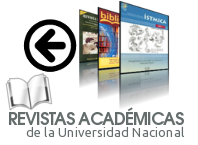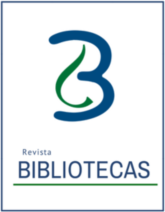Learning Commons and university libraries: spaces for learning in the Library System of the Tecnológico of Costa Rica
DOI:
https://doi.org/10.15359/42-2.1Keywords:
Learning Commons, Collaborative learning, Learning spaces, University libraries, Information and Communication TechnologiesAbstract
Currently, there is a tendency in university libraries to provide services in physical and virtual spaces where the user has infrastructure and guidance to meet their information needs through library and technological services, spaces for collaborative work required for the fulfillment of their academic and research activities. This concept is known as Learning Commons, which is a set of information services using communication technologies in a mixture of physical, electronic, socio-humanistic, and cultural resources in order to strength the teaching learning and research processes, seeking an effective organization and management of resources, as well as optimization of space. The purpose of this article is to develop the didactic and administrative characteristics for the implementation of a learning commons, considered as a new space to “do and learn”, active for social gathering, a space where you can find and access technology, where you can explore and collaborate, with access to digital resources such as books, journals, standards, protocols, among others. Finally, a brief description of the SIBITEC will be made since many of the characteristics of this scheme allow it to be a model to other information centers.
References
Bennett, S. (2015). Putting learning into library planning. Portal (Baltimore, Md.), 15(2), 215-231. doi:10.1353/pla.2015.0014
Bennett, S. (2008). The information or the learning commons: Which will we have? The journal of academic librarianship, 34(3), 183-185. https://libraryspaceplanning.com/wp-content/uploads/2015/09/The-Learning-or-Information-Commons-Which-Will-We-have.pdf
Calderón Jiménez, A. (2014). Propuesta de implementación de learning commons en bibliotecas de educación superior de Costa Rica como aplicación de un servicio de calidad. [Maestría en Ciencias de la Información, Tecnológico de Monterrey]. Repositorio TEC. https://repositoriotec.tec.ac.cr/handle/2238/9672
Calzada Prado, F. J. (2020). Avanzar en el aprendizaje autónomo y social: integración de autoevaluación y evaluación por pares como herramientas de evaluación formativa. En M. C. Pérez Fuentes (Ed.), Innovación docente e investigación en educación (pp. 211-219). Dykinson.
Cherinet, Y. M. (2018). Blended skills and future roles of librarians. Library Management, 39(1/2), 93-105. doi:10.1108/LM-02-2017-0015
Consejo de Departamento de Servicios Bibliotecarios. (2008). Acta No. 11-2008: sesión extraordinaria. Tecnológico de Costa Rica.
Gómez Valverde, L. (2019). Informe de gestión Set. 2011 – Agt. 2019, Departamento de Servicios Bibliotecarios. Tecnológico de Costa Rica.
González Guitián, M. V., Martínez Ríos, M. A., Zayas Pérez, M. R., y López Porras, J. (2017). Nuevos espacios y retos para los actuales profesionales de la información. Revista interamericana de bibliotecología, 40(3), 317-325. doi:10.17533/udea.rib.v40n3a10
González Martínez, L. (2021). Servicios Académicos en Learning Commons de Bibliotecas Universitarias: Una respuesta a los requerimientos educativos actuales. Bibliotecas, 39(1). doi:10.15359/rb.39-1.1
International Association of Library and Institutions. (2015). IFLA school libraries guidelines Netherlands: IFLA. https://www.ifla.org/wp-content/uploads/2019/05/assets/school-libraries-resource-centers/publications/ifla-school-library-guidelines.pdf
Lippincott, J. K. (2015). Libraries and the digital university. College & Research Libraries, 76(3), 283-295. doi:10.5860/crl.76.3.283
Lippincott, J. K. (2006). Linking the information commons to learning. En D. Oblinger (Ed.), Learning spaces (pp. 7.1-7.18). EDUCAUSE.
Lux, V., Snyder, R. J. y Boff, C. (2016). Why users come to the library: A case study of library and non-library units. The Journal of Academic Librarianship. 42(2), 109-117. doi:10.1016/j.acalib.2016.01.004
Mac Kee N. (2005). Los centros de recursos para el aprendizaje y la investigación: CRAI. http://eprints.rclis.org/9167/1/mackee_crai.pdf
Martínez Santos, D.C. (2016). Repensar las bibliotecas de la Universidad de La Salle: una revisión conceptual para el diseño de un nuevo modelo del Sistema de Bibliotecas. Revista de Universidad de la Salle, 71, 135-165. https://ciencia.lasalle.edu.co/cgi/viewcontent.cgiarticle=1505&context=ruls
Prada Forero, S. (9-11 de marzo de 2016). La biblioteca de la Pontificia Universidad Javeriana interpretada como un CRAI [Presentación de la conferencia]. V Congreso internacional de Bibliotecas Universitarias, Lima, Perú. https://repositorio.pucp.edu.pe/index/bitstream/handle/123456789/52622/biblioteca_crai_prada.pdf?sequence=1&isAllowed=y
Patrickson Stewart, S., y Nadine N. (2017). User Services in the Digital Environment. Library Review, 66(4/5), 213-234. doi:10.1108/LR-07-2016-0058
Shank, J., Bell, S., y Zabel, D. (2011). Blended Librarianship: [Re]Envisioning the Role of Librarian as Educator in the Digital Information Age. Reference & User Services Quarterly, 51(2), 105-110. http://www.jstor.org/stable/refuseserq.51.2.105
Sinclair, B. (2009). The blended librarian in the learning commons. College & Research Libraries News, 70(9), 504-507.
Tecnológico de Costa Rica. (2016). Proyecto Mejoramiento de la Educación Superior: Plan de Mejoramiento Institucional-Actualización de iniciativas. https://www.tec.ac.cr/sites/default/files/media/doc/pmi_tec_actualizado_06-06-2016.pdf
Turner, A., Welch, B., y Reynolds, S. (2013). Learning spaces in academic libraries. A review of the evolving trends. Australian Academic and Research Libraries, 44(4), 226-234. doi:10.1080/00048623.2013.857383
Viñals Blanco, A., y Cuenca Amigo, J. (2016). El rol del docente en la era digital. Revista Interuniversitaria de Formación del Profesorado, 30(2), 103-114. https://www.redalyc.org/pdf/274/27447325008.pdf
Downloads
Published
How to Cite
Issue
Section
License

This work is licensed under a Creative Commons Attribution-NonCommercial-ShareAlike 4.0 International License.
Bibliotecas provide immediate open access to their content, based on the principle of facilitating research to the public free of charge and free of charge to promote the global exchange of knowledge.
The journal Bibliotecas is a publication hosted by a public higher education institution, which is supported by public resources. Since its inception, the magazine has offered all its contents free of charge without any restriction on the rights of: reading, downloading and printing in full text. Works published in libraries may be analyzed, quoted and reproduced in whole or in part, mentioning the original source.
The journal Bibliotecas is licensed under the Creative Commons Attribution - Non-Commercial - Share Equal, 4.0 International license; therefore, it is allowed to: share, copy and redistribute the material in any medium or format.

Este obra está bajo una licencia Creative Commons Atribución-NoComercial-CompartirIgual 4.0 Internacional.








